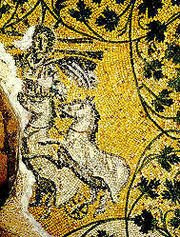Apocryphote of the Day: 8-3-08
/ So what else is there to name it apart from "God," since it is everything. Even if it is given numberless names, they are spoken simply as a reference to it, since it transcends every word, every voice, every intellect, every thing, and (even) every silence.
So what else is there to name it apart from "God," since it is everything. Even if it is given numberless names, they are spoken simply as a reference to it, since it transcends every word, every voice, every intellect, every thing, and (even) every silence.Tripartite Tractate 129.15-25 (Valentinian late second century text)
Mosaic: third century, Vatican grottoe under St. Peter's Basilica, tomb of the Julii, depicting Christ (?) as the sun-god Helios or Sol Invictus riding in his chariot.








































































